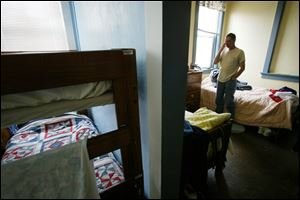
Help set up for veterans to manage their funds
Goal is to prevent local homelessness
11/12/2012
Homeless veteran Harleigh Marsh stands in his shared room at Scott Place shelter in Fairmont, W.Va. A new partnership among several agencies in Toledo aims to prevent homelessness among veterans. The initiative, funded by the Toledo Community Foundation, provides a representative-payee service to area veterans — a service to help manage finances for those who qualify for a benefit check but aren’t able to adequately handle their own spending and household expenses.
A new partnership among several agencies in Toledo aims to prevent homelessness among veterans.
The initiative, funded by the Toledo Community Foundation, provides a representative-payee service to area veterans — a service to help manage finances for those who qualify for a benefit check but aren’t able to adequately handle their own spending and household expenses.
A payee service can especially aid veterans with debilitating conditions, such as a traumatic brain injury or serious mental illnesses, manage their household budgets. The hope is that setting up a payee service can help these veterans retain permanent housing.
The service is also available to veterans with less serious barriers, who are just struggling with managing finances or transitioning to civilian life.
Prior to this, local veterans typically had to use an out-of-town agency or hire a local attorney, for a fee, to have such a service.
“There was a huge need for a reputable organization to do this,” said Joe Cafferty, one of the two representative payees now working at St. Paul’s Community Center, where the program is based. Mr. Cafferty and his colleague are both veterans; Mr. Cafferty served in Iraq as a member of the Army National Guard.
St. Paul’s already provides representative-payee services for people with mental health barriers who receive assistance from a Social Security benefit, so the program was a natural fit for the center, said Marcia Langenderfer, executive director at St. Paul’s.
“One of the ways to end homelessness is to get people access to housing,” said Shawn Dowling, coordinator of health care for homeless veterans at the Veterans Administration in Toledo and Ann Arbor. “But one barrier is people with poor credit might not be able to get past the application process. A payee program can serve as an assurance to prospective landlords.”
Officials estimate the program could apply to as many as 200 people eventually; because the program is just getting started, Mr. Cafferty and others are trying to get the word out.
Jason Brown, deputy director of the Lucas County Veterans Services Commission, said his agency already has referred two veterans to the program.
“We’re excited to be able to make a difference for homeless veterans,” he said.
For more information, call 419-601-5658 and ask for the payee program.
Contact Kate Giammarise at: kgiammarise@theblade.com |or 419-724-6091, or on Twitter @KateGiammarise.